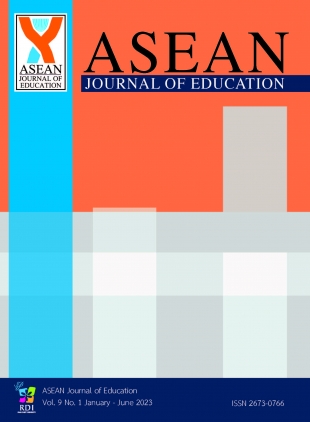The Study of the Effect of Instructional Management by Using Online Lessons Together with Cooperative Learning using Storytelling through Digital Media with Urban Network
Keywords:
Online lessons together, Cooperative learning, Digital storytelling, Urban networkAbstract
This study compared the achievement of Knowledge Management in Information Organization subject between pretest and posttest by using online lessons together with cooperative learning using storytelling through digital media, and to compare teamwork ability between pretest and posttest after online lessons together with cooperative learning using storytelling through digital media. The participants included 24 students of Library and Information Science program, Suan Dusit University who enrolled in the Knowledge Management in Information Technology Organization subject during Semester 2, year 2020. The research was integrated throughout the semester. The research tools implemented were learning achievement test using KR-20 Reliability of Kuder-Richardson equal .95 and teamwork skill test using α – Coefficient reliability of Cronbach equal .916. The statistic used to analyze the data was the calculation of development score from learning achievement test both the pretest and posttest. The researcher calculated the development score according to development criteria of Kanjanawasee (2013) to compare mean score and teamwork ability of the students before and after study with percentage, average and standard deviation. The results showed the following:
1. Learning achievement score of students after study is higher than before study.
2. Teamwork skill of students after study is higher than before study.
From the results, it was found that learning with online lessons together with cooperative learning using storytelling through digital media enhance the learning achievement and teamwork skill. It can be used with learning management in every year of every university by applying it to the content of each subject. Some teaching style needs to be adjusted to fit the student’s learning experience, so the cooperative learning must be applied accordingly.
References
Barbour, M., & Plough, C. (2009). Helping to make online learning less isolating. Techtrends, 53(4), 57.
Dana, W. (2007). Implementing Team-Base Edition Learning in and Introduction to Law Course. Journal of Legal Studies Education, 24(1), 59-108.
Faksanoi, S., Chanruang, J., & Karnka, S. (2015) Development of Online Lessons Based on a New Cooperative Learning Technique Based on Bloom's Theory. In The Eleventh National Conference on Computing and Information Technology, NCCIT2015, 412-417.
Intarakumhang, N. (2014). Student’s Grade according to the Effect of Backward Design trough WebQuest on critical Thinking and Learning Achievement in Information and Communication Subject of Matthayom Sueksa 4 Students (Master’s thesis). Maha Sarakham: Mahasarakham University.
Kanjanawasee, S. (2013). Classical Test Theory (7th ed.). Bangkok: Chulalongkorn University.
Kongpila, K. (2017). Components of Using Social Media in Teaching and Learning. Retrieved from https://www.gotoknow.org/posts/599442
Laohajaratsang T. (2002). Designing e-Learning: Principle of website designing and creating for learning. Chiang Mai: Chiang Mai University.
Manmanee, S. (2014). Finding an appropriate format for Online Presentation. Phitsanulok: Pibulsongkram Rajabhat University.
McCann, D. (2007). Team learning. Retrieved from http://www.tms.com.au/tms12-2c.html
Microsoft. (2010). Tell a story, become a lifelong learner. Retrieved from http://www.learning-v.jp/dst/images/microsoft.pdf
Office of the Education Council. (2017). Higher Education Development Plan Issue 12 (2017 - 2021). Bangkok: Bureau of Policy and Strategy, Office of the Permanent Secretary, Ministry of Education.
Pitrik, R. D. and Mallich, K. (2004). Effect of Person-Centered Attitudes on Professional and Social Competence in a Blended Learning Pradigm. Retrieved from http://www.ifets.info/journals/17.pdf
Poonwiwatchaiyakan, K. (2013). The effect of working process and teamwork on the work efficiency of practitioner level employee (Silom area). Master of Business Administration. Bangkok: Bangkok University
Shawnz, N. & Jun M. (2012). Location Based mobile learning in Singapore Schools. International e-Learning Conference 2012. (IEC2012), 49-53.
Skinner, B. F. (1950). Are theories of learning necessary?. Psychological Review, 57(4), 193-216.
Songkram, N. (2011). Development of Project-based learning and cooperate based learning to create innovational knowledge for bachelor of education students in public higher education institutions. Bangkok: Office of the Higher Education Commission.
Sutthirat, C. (2013). New style of learning management. Nonthaburi: Sahamitr printing & publishing company limited.
TECHSAUCE. (2020). Globish Growth statistic 4 new learning styles, New normal for education. Retrieved from https://techsauce.co/pr-news/globish-edtechcovid-19-social-distancing-new-normal
Thaiedunet. (2008). What is e-learning. Retrieved from http://www.thaiedunet.com/ten_ content/what_elearn.html
Thisanon, N. (2016). Effects of Using Online Lessons with Cooperative Learning using Project-based Learning through Digital Storytelling for Matthayom Sueksa (Master’s thesis). Bangkok: Ramkhamhaeng University.
Tumnanchit, B. (2019). Developing Teaching and Learning Achievements through Collaborative Teaching Techniques from Learning and Innovation Sources in Thailand 4.0. Bangkok: Suan Dusit University
Downloads
Published
How to Cite
Issue
Section
License

This work is licensed under a Creative Commons Attribution-NonCommercial-NoDerivatives 4.0 International License.
1 All articles will undergo a formal peer-review. A panel of experts from within or without the university will examine the article; approval from a minimum of two experts is required for publication. Revisions posed by the experts must be completed by the research prior to publication.
2 Once published in the ASEAN Journal of Education, the article becomes intellectual property of Suan Dusit University. Duplication, in full or part, requires permission from Suan Dusit University.
3 Excluding errors incurred during printing, author(s) are responsible for the content of their articles.






